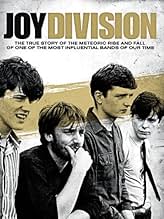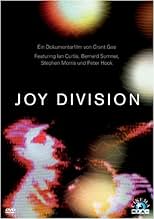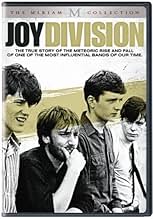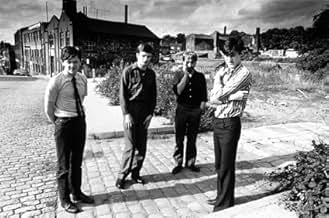Ajouter une intrigue dans votre langueA chronological account of the influential late 1970s English rock band.A chronological account of the influential late 1970s English rock band.A chronological account of the influential late 1970s English rock band.
- Réalisation
- Scénario
- Casting principal
- Récompenses
- 1 victoire au total
Genesis P-Orridge
- Self - Throbbing Gristle
- (as Genesis P. Orridge)
- …
Avis à la une
This is a movie that is good from beginning to end. Of course the main focus is on Ian Curtis as it should be and there is some rare stuff on show here including a recording of Bernard Sumner hypnotising Curtis.
Some rare performances add to the quality of this movie which is essential to any fan of the band.
Some rare performances add to the quality of this movie which is essential to any fan of the band.
Grant Gee's inventive and honest documentary about Joy Division is not just a fine example of non-fiction film-making, but of film-making, full stop.
After the success of "Control", "Joy Division" has a new lease of interest behind it. It is, therefore, very good news to report that the film is not only interesting and informative, but also very effective. It is intelligent, though never ponderous. It is artistic, but never loses sight of its purpose.
The central interest of the film is not so much the eponymous band but the city of Manchester and the time and place which Joy Division found themselves in. Its focus here might tend to the ludicrous at points, but this is balanced by the human stories playing out in front of the northern backdrop.
There is very little complaint to be levelled at this film. It is not a masterpiece or extraordinary, but it is an excellent slice of cinema, knowledge and storytelling.
After the success of "Control", "Joy Division" has a new lease of interest behind it. It is, therefore, very good news to report that the film is not only interesting and informative, but also very effective. It is intelligent, though never ponderous. It is artistic, but never loses sight of its purpose.
The central interest of the film is not so much the eponymous band but the city of Manchester and the time and place which Joy Division found themselves in. Its focus here might tend to the ludicrous at points, but this is balanced by the human stories playing out in front of the northern backdrop.
There is very little complaint to be levelled at this film. It is not a masterpiece or extraordinary, but it is an excellent slice of cinema, knowledge and storytelling.
As a hardcore fan, I really enjoyed this Joy Division doco more than I expected. Given that they were a shortlived band from a provincial area, and had only achieved up-and-coming status at the time of their demise, any documentary maker must face the challenge of the severe lack of video footage of the band, and poor quality of what is available, further exacerbated by the death, and hence unavailability for interview, of some of the key players viz Curtis, Hannett & Gretton. What's more, their active years coincided with Manchester's large-scale redevelopment, hence their old haunts have long since been torn down and replaced. Offset against this is the newfound openness of the remaining players to giving honest and full answers in interviews. They had previously been very reticent, particularly about Curtis whom they professed to be sick of discussing as they tried to establish New Order independent of the Joy Division legacy.
Overall, Gee rises to the challenge brilliantly. Gee's solution was to use extensive interviews with remaining members, brief interviews of many of the bit players, and waffling from some intellectuals explaining the band as being products of their time and place. This is combined with general video footage of 1970's Manchester, snippets of the limited available TV & gig footage, arty stills of the band taken mainly by Anton Corbijn with discussion of the photos' backgrounds, stills showing external shots of the band's old haunts then and now (the "Places that are no longer there" series), and the odd audio recording (e.g. Ian's hypnosis tapes, John Peel getting the speed wrong playing "Atmosphere") with oscilloscope visuals. The briefness of the video snippets used and the snappy editing successfully prevents the viewer noticing the paucity of the source material. Though we are constantly made aware that we are discussing a time and place and singer that are long gone, it all seems appropriate given that their music was mainly about loss.
Highlights included seeing the decaying 1970's Manchester which so inspired and suited their music. It was great to see pictures of the venues I'd only read about, even if they were old stills. There were few truly new facts for the Joy Division anorak, but it did give a sense of time and place and mood to known facts, and put faces and personalities to names. It was fascinating to hear Bernard's detailed account of Ian's first seizure, and the band's reactions to hearing of Ian's suicide first-hand. They are typical northerner artists, in that their brilliant, highly emotional music is created by remarkably dour people, and their sense of humour is cringeworthy. Though the band find their own anecdotes hilarious, Gee edited most of them into an incomprehensible mish-mash to hide how dull and unfunny they were. Lindsay Reade and Lesley Gilbert are remarkably beautiful for fiftysomethings, while the young Annik Honoré is much less pretty than her hold on Ian would suggest. She is overly melodramatic in interviews. Genesis C_Ornflakes is an even bigger freak now than in his Gristle days, and his stories lack credibility.
On the negative side, the intellectuals and their thesis-pushing grated. Joy Division were neither commenting on nor a product of an intellectual notion of "modernity". They were a bunch of rather ordinary Mancunians dreaming of a more exciting life than their dead-end jobs, who happened to be musical geniuses and with a singer/lyricist obsessed by darkly melodramatic bands like the Velvet Underground and the Doors. Nor were they anti-Thatcherites with revolutionary sympathies as the intellectuals claim. The Thatcher government took power in May 1979, whereas punk and post-punk emerged under the previous Labour government. As his wife and bandmates revealed elsewhere, Curtis himself was an ardent Tory with robustly "traditional" views on women and immigrants, while Stephen Morris has said he didn't vote in the first election for which he was old enough through lack of interest.
Overall, Gee rises to the challenge brilliantly. Gee's solution was to use extensive interviews with remaining members, brief interviews of many of the bit players, and waffling from some intellectuals explaining the band as being products of their time and place. This is combined with general video footage of 1970's Manchester, snippets of the limited available TV & gig footage, arty stills of the band taken mainly by Anton Corbijn with discussion of the photos' backgrounds, stills showing external shots of the band's old haunts then and now (the "Places that are no longer there" series), and the odd audio recording (e.g. Ian's hypnosis tapes, John Peel getting the speed wrong playing "Atmosphere") with oscilloscope visuals. The briefness of the video snippets used and the snappy editing successfully prevents the viewer noticing the paucity of the source material. Though we are constantly made aware that we are discussing a time and place and singer that are long gone, it all seems appropriate given that their music was mainly about loss.
Highlights included seeing the decaying 1970's Manchester which so inspired and suited their music. It was great to see pictures of the venues I'd only read about, even if they were old stills. There were few truly new facts for the Joy Division anorak, but it did give a sense of time and place and mood to known facts, and put faces and personalities to names. It was fascinating to hear Bernard's detailed account of Ian's first seizure, and the band's reactions to hearing of Ian's suicide first-hand. They are typical northerner artists, in that their brilliant, highly emotional music is created by remarkably dour people, and their sense of humour is cringeworthy. Though the band find their own anecdotes hilarious, Gee edited most of them into an incomprehensible mish-mash to hide how dull and unfunny they were. Lindsay Reade and Lesley Gilbert are remarkably beautiful for fiftysomethings, while the young Annik Honoré is much less pretty than her hold on Ian would suggest. She is overly melodramatic in interviews. Genesis C_Ornflakes is an even bigger freak now than in his Gristle days, and his stories lack credibility.
On the negative side, the intellectuals and their thesis-pushing grated. Joy Division were neither commenting on nor a product of an intellectual notion of "modernity". They were a bunch of rather ordinary Mancunians dreaming of a more exciting life than their dead-end jobs, who happened to be musical geniuses and with a singer/lyricist obsessed by darkly melodramatic bands like the Velvet Underground and the Doors. Nor were they anti-Thatcherites with revolutionary sympathies as the intellectuals claim. The Thatcher government took power in May 1979, whereas punk and post-punk emerged under the previous Labour government. As his wife and bandmates revealed elsewhere, Curtis himself was an ardent Tory with robustly "traditional" views on women and immigrants, while Stephen Morris has said he didn't vote in the first election for which he was old enough through lack of interest.
A hauntingly beautiful account of the rise of the band Joy Division. As a half-interested fan, I expected not to be too impressed, but I was completely drawn in and mesmerised by the story. As others have noted, it makes a perfect companion piece to 'Control'. Definitely recommended for anyone who has ever heard and enjoyed a Joy Division song.
Joy Division, the mercurial Manchester based masters of dark post punk sounds, who in Ian Curtis had one of the eras most tortured souls.
Directed by Grant Gee and written by Jon Savage, this documentary actually brings nothing new to the table for hardened fans of the band, of which I am unashamedly amongst that number. There is a tendency with musical documentaries to be over praised by fans simply because, well, they just love to see their idols/heroes/inspirations up there on the screen. Grant Gee's film has strong merits as an introduction for those new to the band, for the curious and to those hypnotised by tunes so hauntingly poetic they can reduce you to tears, but again for those who have followed Joy Division and their subsequent brotherhood band, New Order, there is nothing to be learned here.
The absence of Deborah Curtis (Ian's widow) from the doc is annoying, where we are only given printed quotes from her. One can only guess that she refused to be sharing screen space with her love rival, and fellow tormentor of Ian Curtis' psyche, Annik Honoré, the latter of which who is more than happy to fuel the documentary fire. At times this feels like a copy of Anton Corbijn's superb film, Control, only with the real life band members and entourage commenting from the edges of the frame. But then there is of course the live excerpts of the band, which lifts this up to the high levels set by Control and Deborah Curtis' excellent book, Touching from a Distance.
In that, there is the crux, Joy Division the film is essential for fans, to see that performance of Shadowplay and etc etc, it's these moments that make us forgive the narrative, which quite frankly, is a bit of a cash cow cash in. And I really do say that with heavy heart. 8/10
Directed by Grant Gee and written by Jon Savage, this documentary actually brings nothing new to the table for hardened fans of the band, of which I am unashamedly amongst that number. There is a tendency with musical documentaries to be over praised by fans simply because, well, they just love to see their idols/heroes/inspirations up there on the screen. Grant Gee's film has strong merits as an introduction for those new to the band, for the curious and to those hypnotised by tunes so hauntingly poetic they can reduce you to tears, but again for those who have followed Joy Division and their subsequent brotherhood band, New Order, there is nothing to be learned here.
The absence of Deborah Curtis (Ian's widow) from the doc is annoying, where we are only given printed quotes from her. One can only guess that she refused to be sharing screen space with her love rival, and fellow tormentor of Ian Curtis' psyche, Annik Honoré, the latter of which who is more than happy to fuel the documentary fire. At times this feels like a copy of Anton Corbijn's superb film, Control, only with the real life band members and entourage commenting from the edges of the frame. But then there is of course the live excerpts of the band, which lifts this up to the high levels set by Control and Deborah Curtis' excellent book, Touching from a Distance.
In that, there is the crux, Joy Division the film is essential for fans, to see that performance of Shadowplay and etc etc, it's these moments that make us forgive the narrative, which quite frankly, is a bit of a cash cow cash in. And I really do say that with heavy heart. 8/10
Le saviez-vous
- AnecdotesToutes les informations contiennent des spoilers
- ConnexionsReferenced in Film Junk Podcast: Episode 171: Bigger, Stronger, Faster* (2008)
- Bandes originalesDecades
Performed by Nau Ensemble
Licensed courtesy of Warner Music Sweden
Written by Ian Curtis (as Curtis) / Hans Ek (as Ek)
Published by Fractured Music and Jazz Beat Music Entertainment
Meilleurs choix
Connectez-vous pour évaluer et suivre la liste de favoris afin de recevoir des recommandations personnalisées
- How long is Joy Division?Alimenté par Alexa
Détails
- Durée1 heure 33 minutes
- Couleur
- Mixage
- Rapport de forme
- 1.78 : 1
Contribuer à cette page
Suggérer une modification ou ajouter du contenu manquant

Lacune principale
By what name was Joy Division (2007) officially released in India in English?
Répondre






















